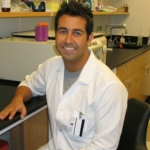USC has funded a new intercampus research program to study the human microbiome and its impact on disease, the first such program at the university.
The human body contains more than 100 trillion microbes known collectively as the microbiome. While the microbiome’s importance in health has been noted — think probiotics and stool transplants — the role that these bacteria play in disease is still not well understood.
Led by William DePaolo, PhD, associate director of USC’s Programs in Biomedical and Biological Sciences (PIBBS), the Committee on Microbiome-Host Interactions in Disease (CMHID) aims to leverage existing technology at USC to drive bench-to-bedside research on the microbiome. The focus is on diseases such as inflammatory bowel disease, vaginal and gastrointestinal cancers, and metabolic disease.
Involving more than 25 USC faculty from the Keck School of Medicine, the Roski School of Fine Arts and the School of Cinematic Arts, the committee was established by a three-year USC Research Collaboration Fund. For more, go to http://www.cmhid.org.
— Alison Trinidad


